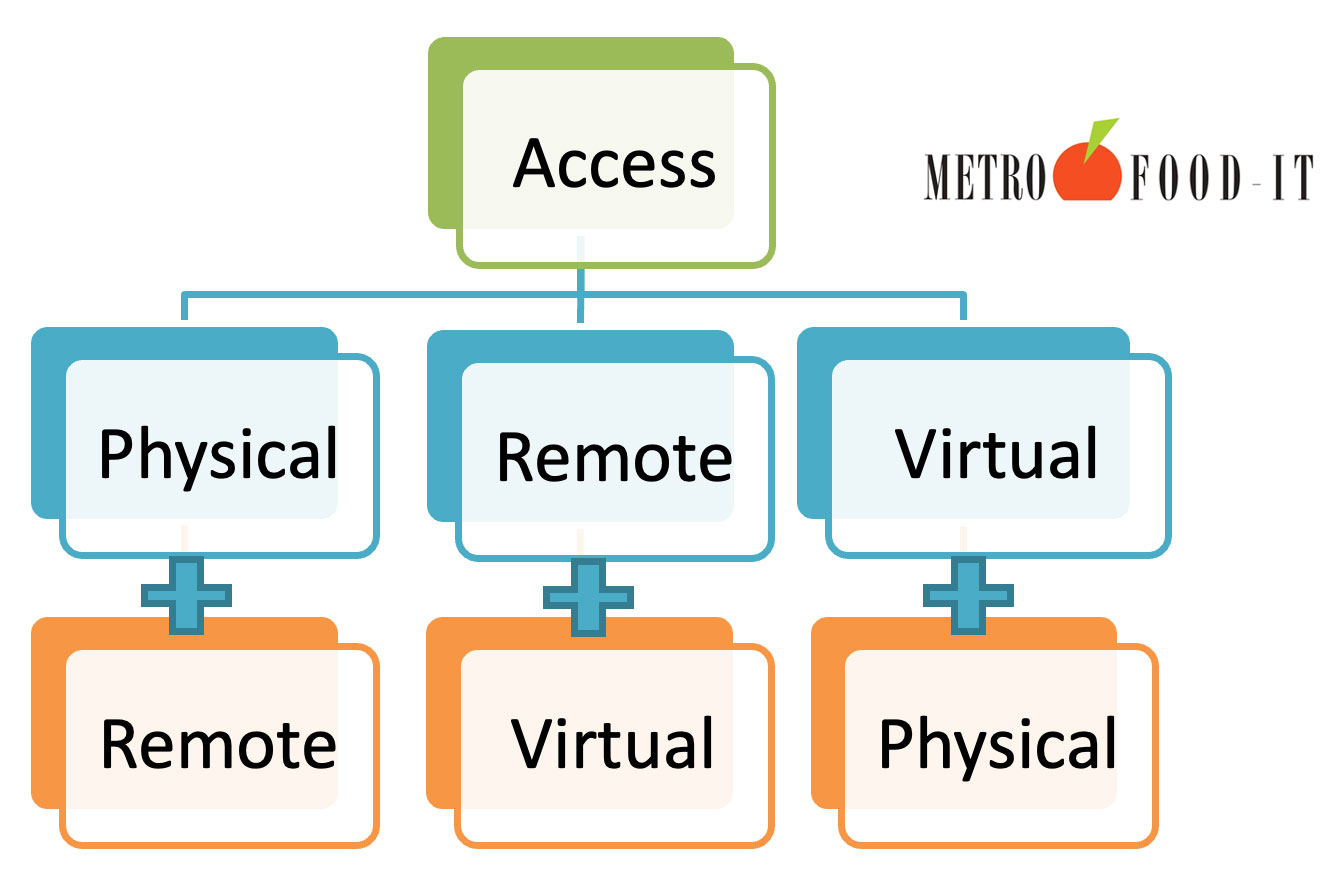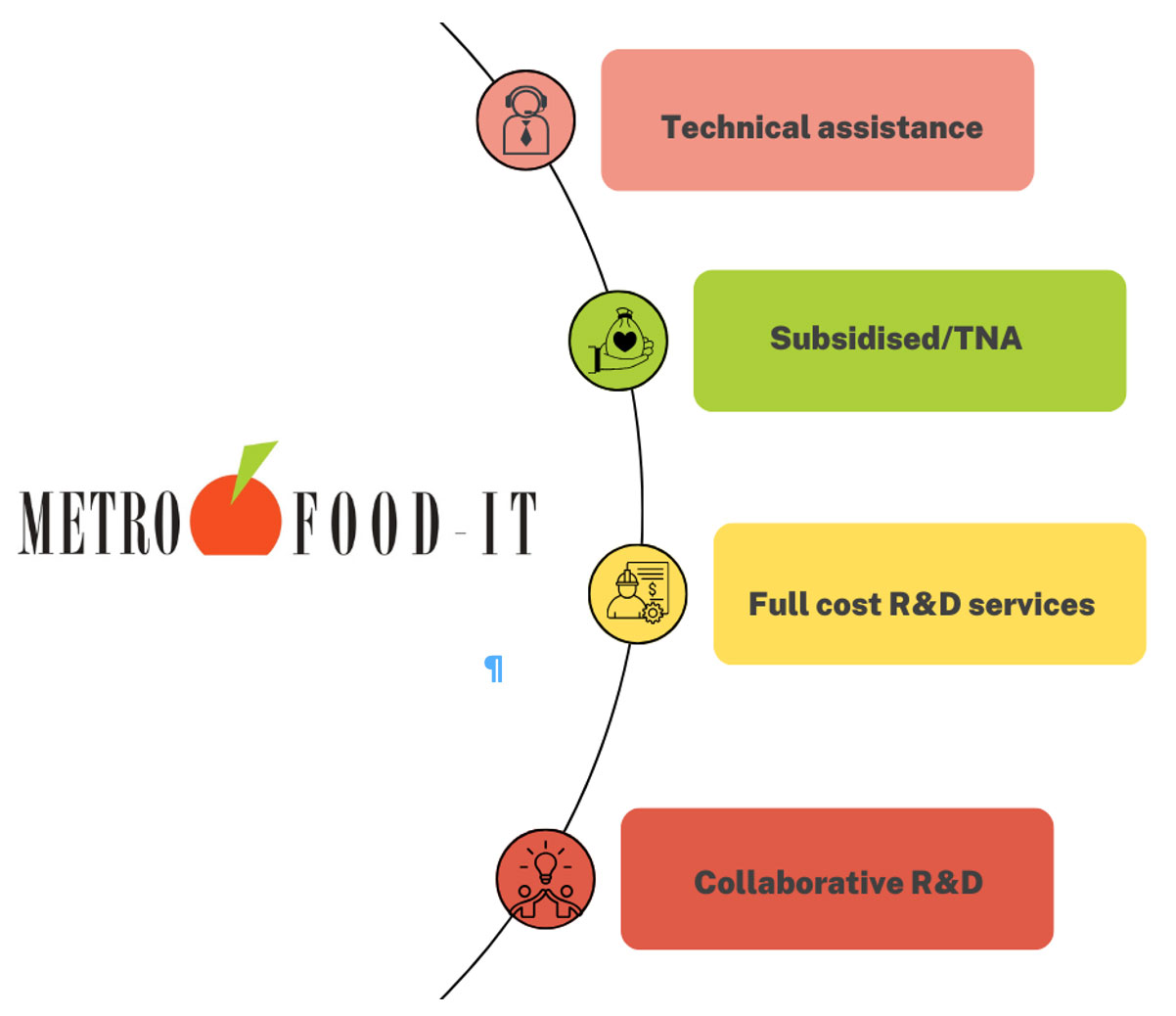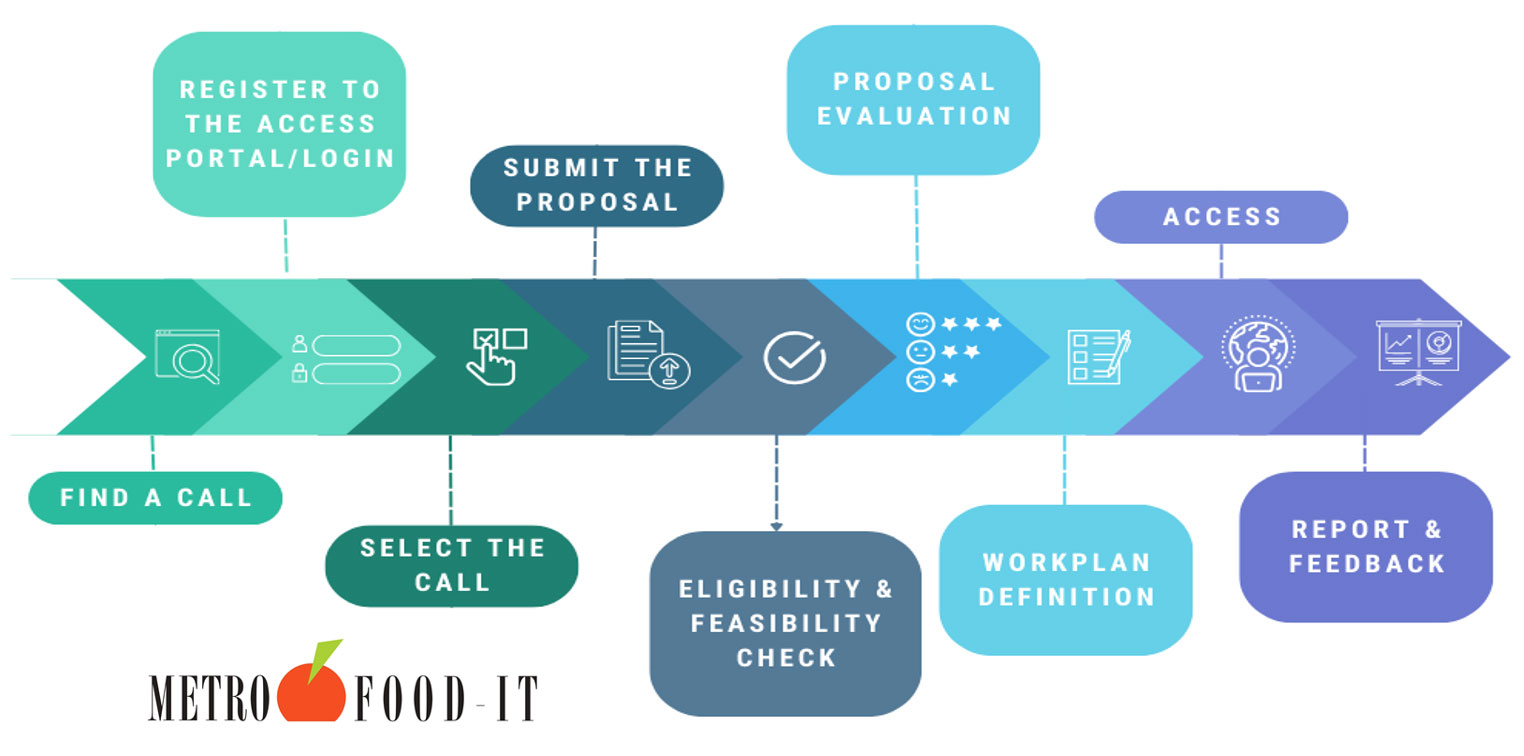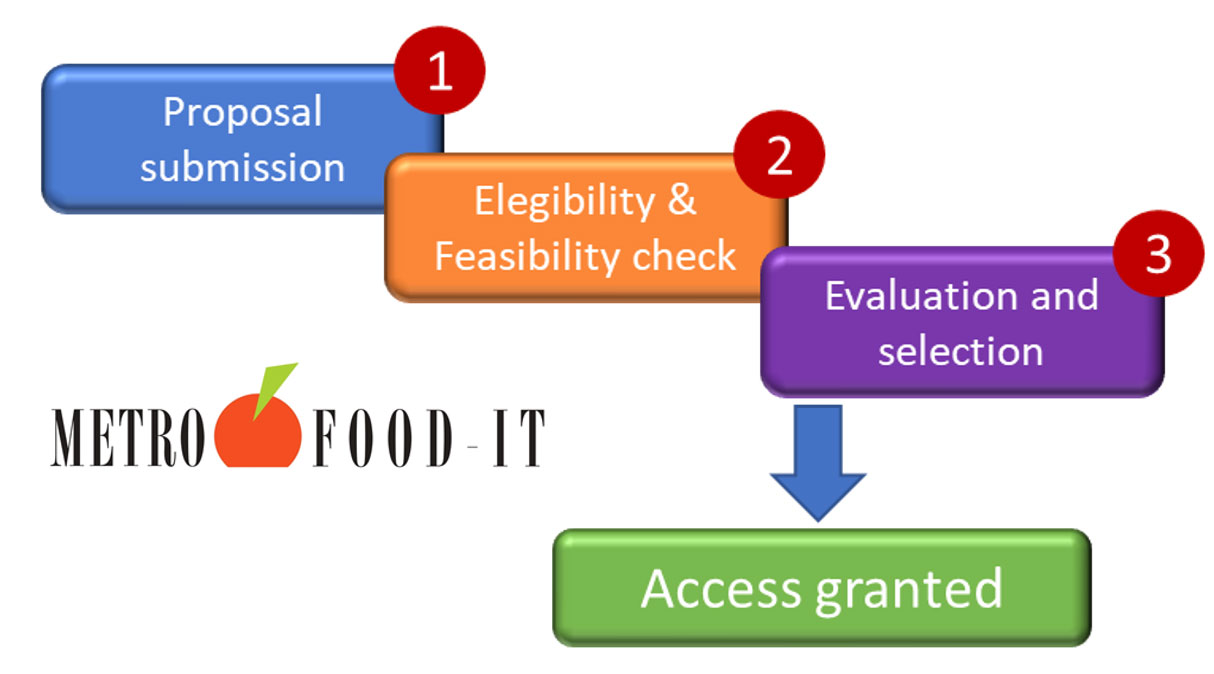Strengthening of the Italian Research Infrastructure for Metrology and Open Access Data in support to the Agrifood
Open call
Guidelines for METROFOOD-IT Open Calls
METROFOOD-IT offers a set of R&D services and access to its various physical facilities across Italy (laboratories and plants) and e-resources (e.g., Apps, software, models) and open data in support to the digitalization of the agrifood system. The facilities can be used for experiments, testing, and studies with scientific or technological objectives to address diverse basic and applied questions related to, e.g., food quality & safety, traceability, food transparency, sustainability and resilience of agrifood systems, and circular economy.
Services are tailored to the four main categories of users we have identified: research/academy, policy makers/food inspection and control, food business operators (SMEs, industries, producer associations), consumers/citizens/consumer associations.
Users (single users or user groups in small consortia), both Italian and from other countries, who intend to use the services of METROFOOD-IT via TransNational Access (TNA) and Virtual Access (VA) can apply to access the facilities listed in the Catalogue of the facilities of to use the services listed in the Catalogue of services of the infrastructure.
All applications must be submitted via the Access portal according to the information provided in this user guidelines.
Access can be access type (Figure 1):
- Physical
- Remote
- Virtual
- Combined (e.g. Physical + Remote; Physical + Virtual; Remote + Virtual)
Users can access METROFOOD-IT services via Transnational Access (TNA) or Virtual Access (VA). Transnational access services can be physical or remote and include the logistical, technological, and scientific support necessary to use the services provided by the research facilities. Through physical access, users visit and physically use the facilities (e.g., laboratories, experimental plants) and receive the service "hands-on”.
Remote access involves using resources and services offered without users physically visiting the facility/installation: for example, sending samples or raw materials to the laboratories and experimental plants, use from remotely of the smart sensing systems.
Through Virtual Access, users can access the resources and data produced or Apps, software and models, without limitation in the number of users.
The following access modes are foreseen (Figure 2):
- Subsidised/Transnational Access
- Full cost R&D services
- Collaborative R&D (specific IPR conditions will apply)
- Technical assistance
Subsidied/Transnational Access ensures free of charge access to the METROFOOD-IT research facilities.
These guidelines specifically refer to Subsidied/Transnational Access, run through the launch of dedicated open calls. These services are provided free-of-charge and "excellence-driven", that is, it depends exclusively on the excellence, originality, quality, and technical and ethical feasibility of the proposal.
For further information, you can contact the Service Officer at:
1. Proposal workflow: submission, evaluation and service provision
Figure 3: Procedure to submit the proposal
The service provision will follow a stated procedure that starts with the user registration in the access portal with the creation of a private area. After having registered, users can select the call they want to apply and therefore submit their proposal via a dedicated online form. The proposal is then evaluated and ranked in one step to assess the scientific relevance and technical feasibility. Users will then be notified about the outcome of the evaluation. For granted projects, the user will take further steps to carry out the project as intended with the help of the METROFOOD-IT Service Officer and the facility managers. Once the project has been completed, the user is requested to fill a simple report with the results achieved, providing also feedback on the whole user experience.
To submit the proposal the user must follow certain procedures (Figure 3) that include registration on the access portal, submission of the proposal on the online form in which the proposal is described in detail. The user proposal is then evaluated and ranked in one step to access the technical feasibility and scientific relevance of the user project, respectively.
After the evaluation phase of the proposal, the user will receive notice of the outcome of the application.
2. Application procedure
The application to the METROFOOD-IT open calls is a procedure involving a total of three main steps leading to the service provision: 1) Proposal submission, 2) Eligibility and Feasibility check, 3) Evaluation and selection (Figure 4).
2.1 Proposal submission
The user must first register on the access portal creating his/her profile with some personal information, such as: name, surname, e-mail address, gender, age, birthday, sector, affiliation.
All personal data will be treated in compliance with the current legislation and the principles of correctness, lawfulness, transparency, and confidentiality – GDPR, Reg. (EU) 2016/679.
Having a profile, the user can just log in to the portal (with ID and password), select the call and start his/her application.
Proposals can be submitted whenever a Call for Proposals is open, which will be announced both on the METROFOOD-IT website and the Access Portal under the open call section.
Figure 4: Application procedure in a nutshell
The proposal is presented by creating and inserting the new proposal on an online form in the access portal and filling in the form with the following information:
- Title (max 150 characters)
- Access (physical, remote, virtual, combined)
- A list of up to 7 keywords
- Maturity level of the work (basic idea, proof of concept, laboratory scale)
- If the application is done as single user or as a team. In case the application is done as a team, details on the other team members (name, surname, affiliation) will have to be provided
- Publications from preliminary work (selecting YES or NO; if yes, a list up to 5 most recent publications will have to be provided)
- Scientific context and objectives of the proposal, where to identify the problem/hypothesis to be addressed by the project, having in mind the state-of-the-art of the topic (max 3000 characters)
- Samples/Materials required, if applicable (max 750 characters)
- Workplan, describing the work to be carried out (max 4000 characters)
- Expected outputs (max 2500 characters)
- Additional information, if necessary (max 1500 characters)
- References, providing a list of up to 5 most recent publications, used to elaborate the sections above
- Ethical concerns (selecting YES or NO; if yes, to include specification in a text field)
- Safety concerns (selecting YES or NO; if yes, to include specification in a text field)
After having filled all the mandatory fields, it is possible to submit the proposal, and an e-mail acknowledging the proposal submission will be received by the applicant.
The access portal will then provide the space for managing the proposal, e.g. check status/edit submitted proposals, provide user reports, provide feedback.
2.2 Proposal evaluation and selection
When the call for proposals is closed, all the submissions received go through the eligibility check and assessment of their technical feasibility and scientific relevance.
Eligibility is verified at a “central level” by the METROFOOD-IT Service Officer against the eligibility criteria. Un-eligible proposals are rejected (with notification to the applicant), while the eligible ones go forward to the feasibility check.
The feasibility of the proposal is evaluated by the specific service provider (the facility selected for the provision of the service) through the action of its Access Manager and in consultation with the scientific team of the facility. In agreement with the Service Officer, the Access Manager of the facility may also enter into direct contact with the user in order to perform some specific verification and/or optimise some aspects of the proposal to make it feasible (e.g., better definition of the number and/or type of samples/materials to be processed, parameters to be analysed, additional information eventually needed; verification of the planned time-scheduling). Feasible proposals are sent for scientific evaluation, the others will be rejected (with notification to the applicant).
Feasible proposals will be scientifically evaluated and selected in a transparent, non-discriminatory and fair manner by a commission of 3 scientific experts/reviewers external to the facility providing the service. The selection is mainly based on:
- scientific and technological excellence
- consistency with the overall METROFOOD-IT objectives
- implementation
- expected output and impact
A score (from 1 to 5) will be assigned by each evaluator for any of the above-mentioned criteria. If needed, the review panel may ask the applicants for further information or ask additional experts for their assessment to evaluate the proposal. Based on these evaluations, the final overall score (from 1 to 5) will be calculated, and all the received proposals will be ranked. Access will be provided according to the ranking and consistently with the number of accesses foreseen by the call/budget availability to cover the accesses free-of-charge. All the applicants will be notified about the scoring of their proposal and final decision (access granted or not).
3. Access implementation
Users with granted access will get into direct contact at first with the Service Officer for the general organisational aspects and then addressed to the Access Manager and scientific team of the facility hosting the service, to finalise the definition of the workplan and practically start the project associated with the service provision. Free negotiation between the users and access providers of the selected proposals is possible to define the details of the implementation of the TNA project, to ensure the best possible implementation and outcome.
The infrastructure staff will provide access to the knowledge and the know-how necessary to complete the proposed experimental work, and – for physical access – on-site logistic support by the infrastructure staff. Users granted for physical access to the facilities will have to comply with the access rules and procedures of the Institute hosting the facility.
Free of charge access to the facilities will be provided for the whole planned experiments (covering, e.g., personnel costs, consumables, facility use, etc.). Apart from the cost of research itself, travel, accommodation, and subsistence costs may or may not be reimbursed by the project budget. Specific conditions will be reported in the announcement of each call.
Users and access providers are responsible for the delivery of access reports after the finalisation of the TNA projects.
User feedback to monitor the quality of access will be provided via an online survey through the access portal.
Dissemination of the TNA project results is highly recommended. Results are expected to be published according to Open Science criteria in open access journals. Users are supposed to acknowledge METROFOOD-IT and the facilities accessed when presenting the results obtained within the TNA scheme (e.g., in presentations, publications etc).
4. Eligibility criteria
METROFOOD-IT calls for proposals or "transnational access calls" are open to users (single users or small consortia) from:
- EU Member States
- EU Associated Countries
- Non-EU Countries or international research organisations. For groups containing users that are not working in an EU or associated country, access will be limited to 20% of the total access.
Following the new directives implemented by EU to suspend cooperation with Russia on research and innovation, in response to the Russian military aggression against Ukraine and in solidarity with the people of Ukraine, proposals are not considered eligible if they come from:
- Russian researchers working in non-Russian/ Russian institutions.
- Non-Russian researchers working in Russian institutions.
Proposals presented by / or with team members belonging to the partner institutions of METROFOOD-IT are considered not-eligible.
Users can belong to all the user categories identified: research/academy, policy makers/food inspection and control, food business operators (SMEs, industries, producer associations), consumers/citizens/consumer associations. Consortia can both involve users from the same category or combine different user categories (e.g., research + food business operators). Proposals from all user categories are subjected to the same feasibility checks and scientific evaluation.
Proposals will have to comply with ethics and security requirements, ensuring that all ethics issues related to activities are addressed in compliance with ethical principles, the applicable international and national law, and ensure the fulfilment of the DNSH principles. Users with granted access will have to accept the data management approaches of METROFOOD-IT, complying with the Data Management Plan.
List of abbreviations
A - Activity
D – Deliverable
DNHS - Do No Significant Harm
EU - European Union
GDPR - General Data Protection Regulation
ID - Identifier
IO - Intermediate Objective
IPR - Intellectual Property Rights
R&D - Research and Development
RI - Research Infrastructure
SME – Small and Medium-sized Enterprises
TNA - Transnational Access
VA - Virtual Access
OU - Operating Unit
WP - Work Package









